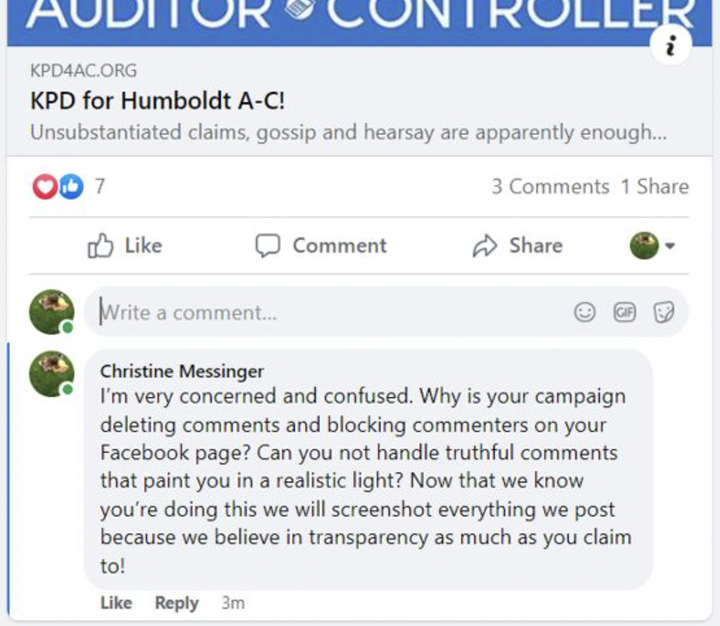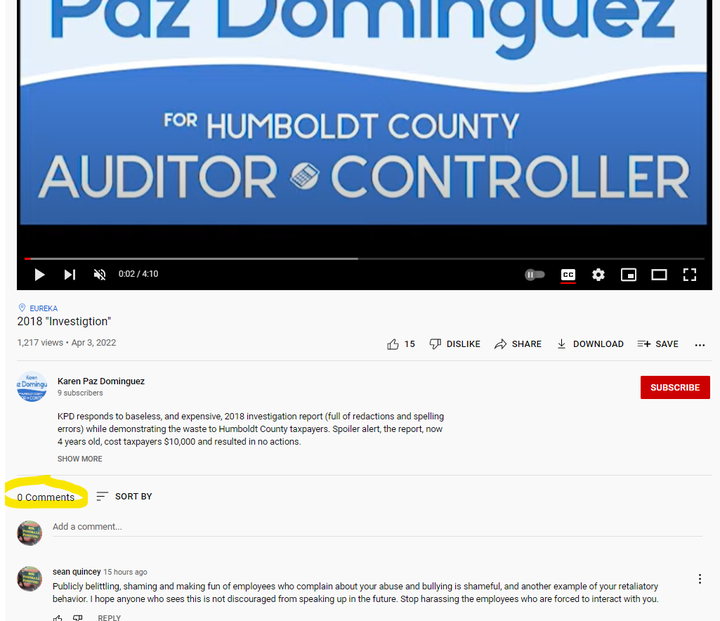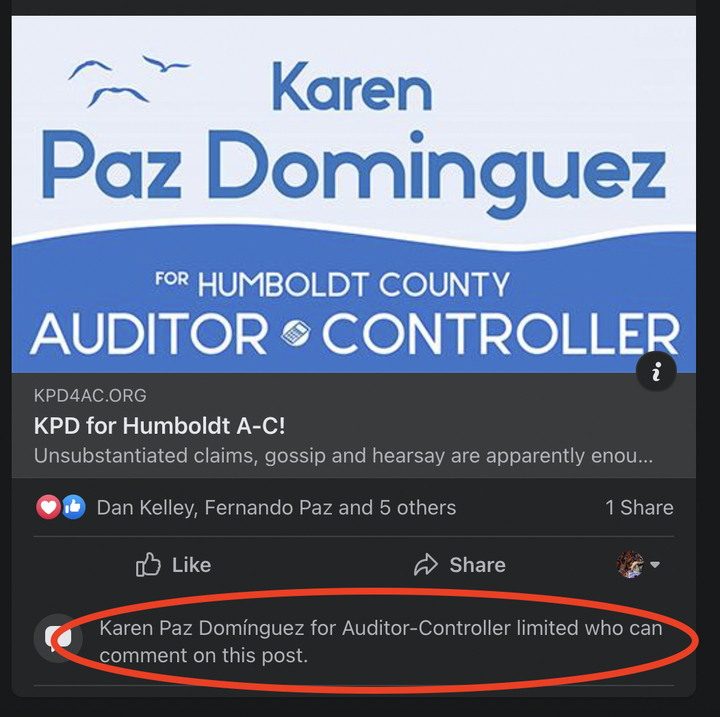Humboldt County Auditor-Controller Karen Paz Dominguez. | Detail of a campaign photo by Jonathan DeSoto, Facebook.
###
In the midst of a contentious re-election bid, Humboldt County Auditor-Controller Karen Paz Dominguez has been deleting critical comments and blocking users from her campaign’s social media pages, moves that critics say run counter to her stated platform values of transparency and accountability.
Three people, including two county employees, recently reported to the Outpost that Paz Dominguez had deleted comments they’d posted online — two to the Facebook page “Karen Paz Dominguez for Auditor-Controller” and one to a YouTube video posted by Paz Dominguez — and they were subsequently blocked from commenting on the Facebook page.
California’s Public Records Act requires government agencies to preserve public records regardless of physical form, and according to the California Records and Information Management Program (CalRIM), a department of the Secretary of State, most social media content, including comments, is subject to those rules.
The department notes that it can be challenging to determine whether social media content qualifies as a public record. The First Amendment prohibits public officials from excluding citizens from public forums such as city council meetings and town halls, but does Paz Dominguez’s campaign page on Facebook represent a public forum?
A guidebook produced by CalRIM says the answer to such questions hinges on content and context. It advises that any content pertaining to an organization’s official business, mission and policies should be considered a public record, along with anything that documents a controversial issue, involves prominent entities within the constituency or contains information that can’t be found elsewhere.
Some prominent court cases have tackled this issue in recent years. In 2019, for example, the U.S. Court of Appeals for the Fourth Circuit ruled in the case of Davison v. Randall that the interactive portion of a public official’s Facebook page is indeed a “public forum,” and so an official can’t block people from it simply because of the opinions they express. Former president Donald Trump was sued for blocking people from his Twitter account, and the U.S. Court of Appeals for the Second Circuit found that in doing so he violated the First Amendment.
In an email, Paz Dominguez told the Outpost that, after careful consideration, she deleted the comments in question because she didn’t want the page “to be turned ugly by incessant and obsessive misinformed attacks.”
She continued, “Those commenters could have just as easily sent me a message to share their concerns and maybe even hear my perspective but they chose not to proving that they’re not really interested in getting primary source information. Some might refer to this behavior as ‘trolling’.”
One of the people whose comment got deleted is Paul Rodrigues, a certified public accountant who previously worked as finance director for both the City of Eureka and the City of Fortuna. (He’s now working as finance director for the Bay Area city of Pittsburg.)
Rodrigues said he posted a comment on this April 3rd post, which links to a YouTube video in which Paz Dominguez mocks a 2018 independent investigation report that found she had fostered an atmosphere of retaliation, hostility and bullying while demonstrating a lack of leadership and making poor policy decisions, among other conclusions. (You can download a heavily redacted version of the 59-page report by clicking here.)
“I normally wouldn’t even have posted on her page … ,” Rodrigues said, “but I thought it was pretty egregious that she made fun of harassment that was found to be of merit.”
In the YouTube video, Paz Dominguez summarizes one employee’s complaint about being denied pizza that had been provided to other staff. Addressing the unidentified complainant with evident sarcasm, she looks into the camera and says, “I’m sorry. I hope I can make it up to you someday.”
Rodrigues said he challenged her to elaborate. “I [wrote], ‘Great, now comment on the other instances of harassment that were found to be of merit,” Rodrigues told the Outpost. His comment, posted on the morning of April 6, got deleted within 20 minutes, he said.
Believing this deletion to be illegal, Rodrigues promptly emailed a complaint to the California Fair Political Practices Commission. The agency’s enforcement division staff emailed him back, saying the FPPC only has authority to enforce the Political Reform Act, which doesn’t regulate such actions.
Regardless, Rodrigues said it was bad practice for a public official. “I just think it’s a little ironic, demanding transparency from others when she’s not being transparent herself.”
Asked via email to respond, Paz Dominguez said Rodrigues now lives in another county and “is not the authority in my field nor is he an elected official.” She added, “He and I didn’t work together and he has disclosed to me that he was asked by his friends to ‘speak up on their behalf’ so he is not speaking from direct experience but rather just adding to the counterproductive noise.”
Rodrigues, in turn said, “[T]his continues a pattern of behavior in which she characterizes anyone who disagrees with her as attacking her personally.”
Christine Messinger recently published a comment under the same Facebook post and, like Rodrigues’, it was quickly deleted. Messinger retained a screenshot of her comment, though:
Screenshot of a since-deleted comment on the Facebook page “Karen Paz Dominguez for Auditor-Controller.”
Messinger works in the media office of the county’s Department of Health and Human Services, though she said she made the comment on her lunch break and was speaking as a private citizen. She has since been blocked from commenting on the page.
Deputy County Administrative Officer Sean Quincey posted a comment under Paz Dominguez’s YouTube video on the day it was posted, he told the Outpost. His comment was quickly deleted, though he, too, retained a screenshot, which he forwarded:
If the text in that image is too small to make out, Quincey’s comment says, “Publicly belittling, shaming and making fun of employees who complain about your abuse and bullying is shameful, and another example of your retaliatory behavior. I hope anyone who sees this is not discouraged from speaking up in the future. Stop harassing the employees who are forced to interact with you.”
At some point this week, Paz Dominguez changed the settings on her campaign Facebook page to further limit who can comment. A notice now appears under all posts:
Asked about this, Paz Dominguez said, “That’s a setting option on the post itself that limits [commenting] to pages and profiles that follow the page, if I remember correctly.”
When initially asked about deleting comments and blocking users, Paz Dominguez argued that because this Facebook page is designated for a political candidate, it’s not subject to provisions in the California Public Records Act that prohibit public officials from deleting public comments and blocking people.
“My campaign page is designated as a ‘Political Candidate’ page, not as a ‘politician’ or official government page for the Auditor-Controller’s Office,” she said in an email. “I also do not perform any official work via that page and some volunteers also have administrative access.”
In scrolling back through the page history, however, the Outpost found close to a dozen posts that addressed official county business rather than political campaign activity.
The page was created in November of 2017, roughly six months before Paz Dominguez was elected. Once she assumed office in early 2018 2019, Paz Dominguez continued to publish posts to the page, using it to communicate with the general public as well as county vendors and employees. Here, for example, is a screenshot of a post in which she invited “everyone” to attend a Board of Supervisors meeting to hear her presentation of the county’s audited financial statements.
She also used the page to distribute a press release, encourage people to apply to serve on the county’s Measure Z citizen advisory committee, report on a conference of state controllers that she’d attended in Sacramento and communicate with county employees and the public following a power outage.
In March of 2020, at the start of the pandemic, she published a post urging county employees and vendors who receive paper checks to instead enroll in the county’s electronic funds transfer process, and she published the county email address to which they should send their requests.
Not only do these posts contradict Paz Dominguez’s claim to have never used the page for any official work; they’re also relevant to the question of whether the page should be considered a public forum.
The case of Davison v. Randall concerned the chair of a Virginia county’s board of supervisors, Phyllis Randall, who briefly blocked a critic from her official Facebook page and deleted a comment he made about her colleagues’ management of public funds. The critic sued, arguing that Randall had violated his First Amendment rights by removing him from a public forum.
In its decision, the court dove deeply into the questions of
- when a public official’s conduct amounts to state (i.e. “government”) action and
- under what circumstances a social media page constitutes a public forum.
The court’s ruling notes that while “there is no specific formula for determining whether state action is present … an official’s conduct is more likely to amount to state action when it ‘occurs in the course of performing an actual or apparent duty of his office.’”
Elaborating, the ruling states, “In the context of an alleged First Amendment violation, in particular, this Court has found that a challenged action by a governmental official is fairly attributable to the state when ‘the sole intention’ of the official in taking the action was ‘to suppress speech critical of his conduct of official duties or fitness for public office.’”
Ultimately, the court’s three-judge panel ruled that because of how Randall administered her Facebook page — using it as a tool of governance, providing information to the public, opening it up to public comments, etc. — she “acted under color of state law” in deleting the comment of a critic and blocking him from the page, thereby violating his First Amendment rights.
It’s important to note that the Fourth Circuit’s order only controls public officials and agencies in Virginia and nearby states. While other jurisdictions have yet to set precedent on the matter, public officials elsewhere in the country have stopped censoring critics after facing lawsuits.
The Outpost drew Paz Dominguez’s attention to the decision in the Randall case and noted that some might argue that her actions in deleting comments and blocking people were done under color of state law, given that she’d evidently used the page to interact with the public about official county business. We cited some of the examples noted above.
She replied via email late Tuesday night, saying, “one might argue that something is work-related even if it’s just sharing public County information.”
As for the posts that pertained to official county business, rather than campaign activity, Paz Dominguez said she’d removed them from the page entirely after receiving our inquiry.
“To avoid any further confusion about how my campaign page is used, I’ve gone ahead and removed the old posts you referenced,” she said.
Couldn’t that be considered destroying public records?
Paz Dominguez doesn’t think so. “You can rest assured that I sought the advice of legal counsel prior to doing so and received confirmation that it is appropriate,” she said in a follow-up email.
In a previous email she said that only two people had been blocked from her page, and that was “due to their abusive conduct and false accusations.” (She later said the number was three, not two.) We asked if she had retained copies of the deleted comments and, if not, if she could specify exactly how they were abusive and false.
She said she did not retain any copies of the comments, adding, “I stand [behind] our decision to not tolerate abusive and harassing comments.”
On Tuesday night, after removing many of her page’s old posts, she added a new one that says the page was created “to share information and updates about Karen Paz Dominguez as a candidate for the office of Auditor-Controller and about the election campaign itself.”
The message continues:
This page is not the official page of the Office of the Auditor-Controller and is not a public forum to discuss official County business. We must take great care when moderating posts and comments on this page as the candidate is also the current elected official. Because of this, we may need to implement additional restrictions so as to not violate the boundaries between County Official and Political Candidate.
Please note that this page is managed by the candidate, the campaign committee members, and volunteers, and we have a zero tolerance policy for abusive and harassing behaviors.




CLICK TO MANAGE